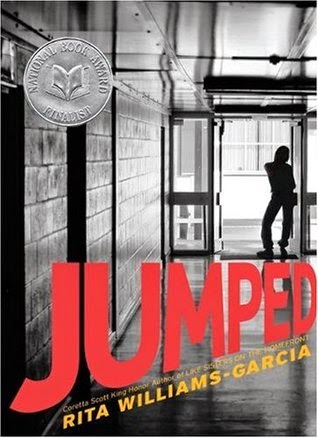I was packing up some books, and I checked to see what I wrote about Jumped by Rita Williams-Garcia (Amistad). Much to my surprise, nothing, even though this was a highlight on the contemporary shelf I've been clearing out.
Trina, Dominique, and Leticia are in a pressure cooker also known as adolescence. Trina, a young Latina girl immersed in art and a self-imposed picture of her worth, is too self-absorbed to notice when she accidentally wrongs Dominique in the hall one morning. Dominique, banished from the basketball team, focuses her anger there, and vows to take Trina down after school. Leticia witnesses the whole thing, but is inclined to never, ever get involved--she'd much rather watch the world than be part of it, even though she's the only one who has the voice to prevent the coming violence. Over the course of just one day, Leticia has to decide.
There are two things that fascinate me about this book. The first is how much Williams-Garcia packs into the slender story. There's the despair and powerlessness of getting through school and all its restrictions along with the acknowledgment that one can have great power within such a system. There is the idea that we have choices we don't know we have. There's a look at addiction, in a way; here, it's to the short-lived stories that Leticia craves, whether gossip or on television. There's a look at the desire to control something, anything, in one's own life, especially when one cannot see any real future. There's an acknowledgement that we fail, that our schools fail, that our society has failed to support many students in huge urban schools. I've known girls like Trina, Dominique, and Leticia, and I know that the story on this page hasn't been fiction for them. Even without that, there is much to discuss, and I think Jumped would make an incredible classroom read.
The second fascination is the incredible voice. Chapters rotate among the girls, and each has a distinct and recognizable voice. I read so many books that alternate POV, and the main difference between the (usually two) main characters is whose name heads the chapter; if I'm lucky, the POV adheres a little closer to the chapter's character and doesn't repeat too much of what came before, or remove all of the mystery when the two meet. In Jumped, I have the sense that each girl is firmly rooted in her perspective, and that while they share some ideas and language by virtue of being at the same school, they each have a distinct story. Jumped is a must-read for writers who plan to narrate from multiple characters' perspectives.
